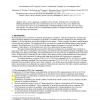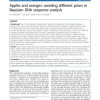11 search results - page 1 / 3 » DNA Starts to Learn Poker |
DNA
2001
Springer
14 years 4 days ago
2001
Springer
DNA is used to implement a simplified version of poker. Strategies are evolved that mix bluffing with telling the truth. The essential features are (1) to wait your turn, (2) to de...
AAAI
2008
13 years 10 months ago
2008
We propose an opponent modeling approach for no-limit Texas hold-em poker that starts from a (learned) prior, i.e., general expectations about opponent behavior and learns a relat...
BMCBI
2006
13 years 7 months ago
2006
Background: Understanding the molecular details of protein-DNA interactions is critical for deciphering the mechanisms of gene regulation. We present a machine learning approach f...
ESANN
2008
13 years 9 months ago
2008
In this paper the application of reinforcement learning to Tetris is investigated, particulary the idea of temporal difference learning is applied to estimate the state value funct...
BMCBI
2010
13 years 7 months ago
2010
Background: One of the challenges of bioinformatics remains the recognition of short signal sequences in genomic DNA such as donor or acceptor splice sites, splicing enhancers or ...


